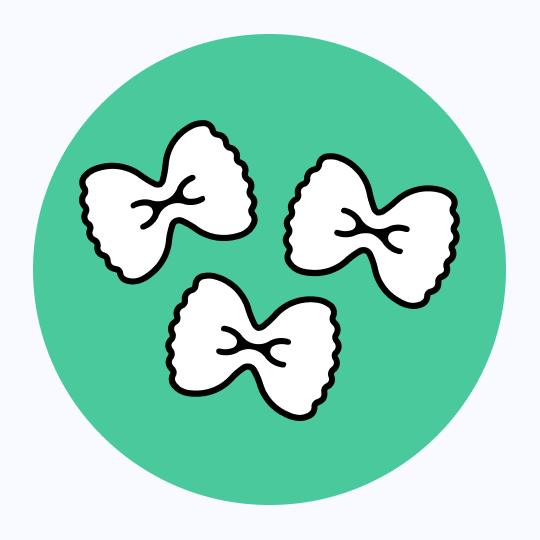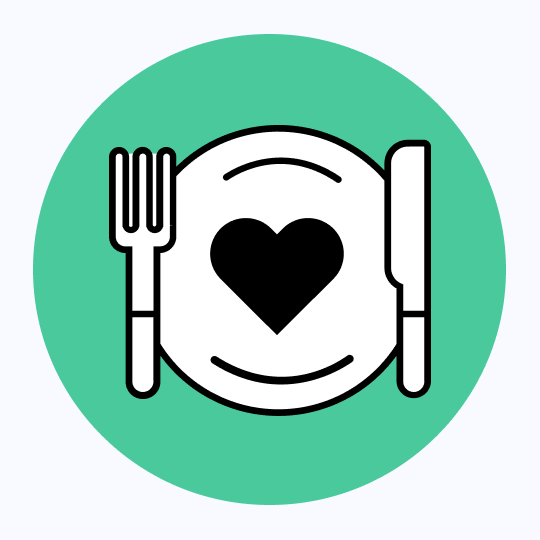Written by By: Zainab Haque, Registered Dietitian
Does nutrition ever feel confusing to you? What should I eat? When should I eat? Am I doing this right? I’m sure we’ve all asked ourselves similar questions. Nutrition is a popular topic, but with so much information out there it’s difficult to tell what is reliable. In honor of National Nutrition Month, here is a breakdown of 5 common nutrition myths.

- Myth: Saturated fat should be avoided at all costs
Truth: Some of the biggest misconceptions in nutrition revolve around one of the most important nutrients: fat. It is believed that saturated fat raises bad cholesterol (LDL cholesterol), contributing to the clogging of arteries and increasing risk of cardiovascular disease. Red meat, full fat dairy products, and many processed foods are common sources of saturated fat. Current guidelines from the American Heart Association and the World Health Organization recommend limiting the intake of saturated fat. However, recent evidence has presented conflicting results suggesting that saturated fat alone has minimal effect on the risk of heart disease. It turns out it may not be as harmful as it’s accepted to be. An observational study in the Journal of the American Heart Association examined the relationship between fats from different food sources and the risk of developing heart disease.1 Results showed that saturated fat itself was not related to a higher risk of heart disease. Different foods containing saturated fat impacted the risk of heart disease differently. While it is necessary for certain populations to monitor their saturated fat intake, for the average healthy individual, consuming saturated fat in moderation should not be harmful. The focus should be on the whole composition of foods rather than on single macronutrients.

2. Myth: Cutting out carbohydrates is necessary to lose weight.
Truth: It’s the age-old tale: carbohydrates are the culprit. Yet, carbohydrates are one of three macronutrients essential for many functions taking place in our bodies. Carbohydrates are broken down into glucose, a form of sugar, in the body, which is the primary fuel for the brain and red blood cells. Common sources of carbohydrates include bread, pasta, rice, potatoes, and beans. Carbohydrates come in three main forms – sugar, starch, and fiber. Sugar is a refined carb while starch and fiber are complex carbs. Complex carbs provide many benefits such as improved digestive health, blood sugar control, and feeling fuller longer.2 Refined carbohydrates should be consumed in moderation considering they are found in most processed foods. Cutting out carbs completely or even to a severely low point can result in headaches, reduced energy, muscle cramps, and a deficiency in key nutrients.3 People who cut out carbs often experience rapid weight loss, but sometimes gain the weight back quickly since it is not always a sustainable approach. Certain disease states such as diabetes require carbs to be more well-controlled. However, adopting a lifestyle change is more effective for not only losing weight, but keeping it off.

3. Myth: Calories in, calories out
Truth: Sounds simple right? Weight loss or weight gain is only controlled by the calories you consume? Not quite! Each body is different and burns calories depending on multiple different factors such as metabolism, the type of food eaten, and genetics.4 Rather than concentrating on hitting a specific number, we should focus on the quality of foods that we eat. For example, one donut and half of an avocado each contain approximately 200 calories. While the calorie content is about the same, the nutritional value is significantly different. Donuts are composed mainly of refined carbs and fat whereas avocados contain monounsaturated fats, potassium, magnesium, vitamin C, and vitamin B6. Although calories are not completely irrelevant and hold an importance when it comes to weight management, they are only one piece of the puzzle. Reality is, not all calories are created equal.

4. Myth: Detox diets are essential for cleansing your body
Truth: Detox diets claim to get rid of the toxins in your body and “cleanse” you. What toxins exactly? Most companies that advertise these detox diets rarely specify which toxins they actually remove. Our bodies already have the ability to get rid of toxins through our liver and kidneys. The main function of the liver is to filter the blood coming from the digestive tract before it moves to the rest of the body.5 It also detoxifies and removes toxins from the body’s bloodstream. The same goes for the kidneys whose job it is to remove waste and extra fluid from the body as well as maintain a healthy balance of minerals.6 Many detox diets claim to increase weight loss, but that is likely due to the large decrease in calorie intake, water weight, and fecal weight. Protein and vitamin deficiencies are just some of the risks associated with detox diets due to such stringent calorie and nutrient restrictions. We don’t need detox teas to cleanse our bodies – our organs do it every day.

5. Myth: Don’t eat after 8 pm
Truth: We’ve all probably heard this one before. The main reason being because people tend to choose foods higher in sugar, fat, and calories when eating later at night, typically eating out of boredom or stress. Eating excess calorie-dense foods will lead to weight gain regardless of the time of day they’re eaten. A small research study observed two groups of people consuming the same healthy diet: one group ate a majority of their calories in the beginning of the day and the other group later in the day.7 Both groups of people lost weight regardless of the timing of their meals. If you get hungry late at night, try choosing a light, healthy snack to satisfy that craving. Eating late at night or right before bed may lead to complications such as digestive issues and sleep problems. However, what you eat overall is more important than the time of day you eat it.
Bottom line: A ton of information is out there and a lot of which can be misleading. Remember to look for evidence-based resources when researching different topics. You can always consult our registered dietician at ivira with any questions you may have!
References:
- Steur M, Johnson L, Sharp SJ, et al. Dietary fatty acids, macronutrient substitutions, food sources and incidence of coronary heart disease: Findings from the epic‐cvd case‐cohort study across nine European countries. Journal of the American Heart Association. 2021;10(23). doi:10.1161/jaha.120.019814
- Choose your Carbs wisely. Mayo Clinic. https://www.mayoclinic.org/healthy-lifestyle/nutrition-and-healthy-eating/in-depth/carbohydrates/art-20045705. Published April 17, 2020. Accessed March 10, 2022.
- Can a low-carb diet help you lose weight? Mayo Clinic. https://www.mayoclinic.org/healthy-lifestyle/weight-loss/in-depth/low-carb-diet/art-20045831. Published November 18, 2020. Accessed March 10, 2022.
- Stop counting calories. Harvard Health. https://www.health.harvard.edu/staying-healthy/stop-counting-calories#:~:text=Cut%20calories%20%E2%80%94%20specifically%203%2C500%20calories,just%20wrong%2C%22%20says%20Dr. Published October 1, 2020. Accessed March 10, 2022.
- Chapter 10. Functional Anatomy of the Liver and Biliary System. In: Barrett KE. eds. Gastrointestinal Physiology, 2e. McGraw Hill; 2014. Accessed March 10, 2022. https://accessmedicine.mhmedical.com/content.aspx?bookid=691§ionid=45431411
- Renal Functions, Basic Processes, and Anatomy. In: Eaton DC, Pooler JP. eds. Vander’s Renal Physiology, 8e. McGraw Hill; 2016. Accessed March 10, 2022. https://accessmedicine.mhmedical.com/content.aspx?bookid=2173§ionid=163663040
- Landsverk G. Eating later at night does not cause weight gain, study finds. Insider. https://www.insider.com/does-eating-night-cause-weight-gain-not-according-new-study-2020-11. Published November 9, 2020. Accessed March 10, 2022.